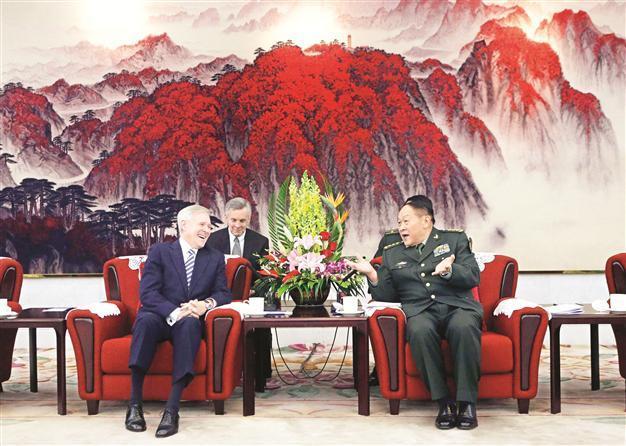Military build-up poses no threat to the world: China
BEIJING

US Navy Secretary Mabus (L) talks with China’s Defense Minister Guanglie in Beijing. Liang stressed the need for cooperation between both sides. REUTERS photo
China’s military build-up poses no threat to the world, Defense Minister Liang Guanglie said yesterday, in an effort to allay fears among Asian neighbors amid long-running maritime disputes.
The United States, Japan and many other Southeast Asian states have frequently expressed worries about China’s double-digit defense spending increases and expanding naval reach, saying Beijing’s plans lack transparency.
“There is absolutely no need for that,” Liang told Reuters, when asked about neighbors’ concerns.
“The Chinese military must develop, but there’s no ‘worry’ or ‘fear’ as the outside world says,” he said before a meeting with visiting U.S. Navy Secretary Ray Mabus. “That’s not what China is about.”
China’s growing military influence has coincided with a more assertive diplomatic tone, evident in rows with Japan and Southeast Asia over disputed islands. China has also told the United States, with President Barack Obama’s “pivot” to Asia, not to get involved.
Vietnam refuses Chinese passportsLiang, speaking at China’s Defense Ministry, stressed the need for cooperation between Beijing and Washington, which has called on China to share more about its military ambitions.
“We should develop the ties between us, between our two militaries, touch on some of our differences, resolve conflicting views,” Liang said before meeting Mabus. “We should push forward the development of our two powers, and push forward the development of a new China-U.S. military relationship,” he said. “Our two countries’ ties are very important.”
Meanwhile, Vietnamese immigration officers said they were refusing to stamp entry visas into controversial new Chinese passports which feature a map of Beijing’s claim to almost all of the South China Sea, Agence France-Presse reported.
Vietnam has said the computer-chipped passports violate its sovereignty and has demanded Beijing withdraw the documents, which show the contested Paracel and Spratly Islands as Chinese territory.
“We issue them a separate visa,” said an official, who did not want to be named. Even with the new passports, however, “Chinese citizens can still travel normally through the border gate,” the official added.
